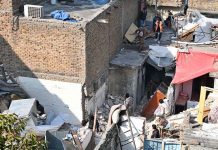ISLAMABAD: A recent research published by the Centre for Peace and Development Initiatives (CPDI) has revealed huge gaps in enabling the population of the flood-hit areas of Sindh and Balochistan to use their fundamental right to vote.
The CPDI on Thursday held a stakeholders’ dialogue on the study made by Naseer Memon, a development professional expert on climate change, disaster management and livelihoods.
The author told the participants that he compiled the study after having detailed group discussions with the people of flood affected areas of Sindh and Balochistan, including women and youth, besides stakeholders engagements and inclusive surveys to gauge the prevailing ground pulse in the wake of general elections 2024, scheduled for February 8.
Chairperson of Senate’s Standing Committee on Climate Change Seeme Ezdi, speaking during the dialogue, said use of vote right was an important public responsibility that should be ensured by the masses to bring a change in their lives. She noted that it was an uphill task to make the people realise their right to vote during electoral campaigns.
“The issues pertaining to voters highlighted in the study are serious gaps that will hamper efficient electoral process.
The flood impacted populace bearing expired CNICs (Computerised National Identity Cards) can be extended by the NADRA,” she added. Senator Ezdi underscored that the 2022 flood devastation washed away over 13,000 kilometers roads and some 1,444 bridges in Balochistan and Sindh where population was still awaiting relief and assistance. –Agencies




